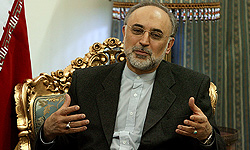FM: Iran Always Remains beside African Nation


Iranian Foreign Minister Ali Akbar Salehi said Tehran has always supported development plans in Africa and will stand beside the African nations forever.
“Iran has always supported development plans in the African continent and sides with this continent’s people to help them have an honorable life and free from discrimination,” Salehi said at a ceremony held to commemorate the ‘Africa Day’ at the Algerian embassy in Tehran on Sunday.
He also underlined Iran’s preparedness to share experiences in technical, engineering, scientific and technological fields with the African states, and said Tehran is also striving to pave the way for the further expansion of trade and economic cooperation with Africa.
Iranian President Mahmoud Ahmadinejad’s administration has striven hard to maximize relations with the African continent.
Iran is also an observing member of the AU and has shown an active presence in previous AU summit meetings.
The country is considered as one of the AU’s strategic partners along with India, Japan, China, several South American states and Turkey, while Tehran is also believed to be prioritizing promotion of its economic and political ties with the African states.







